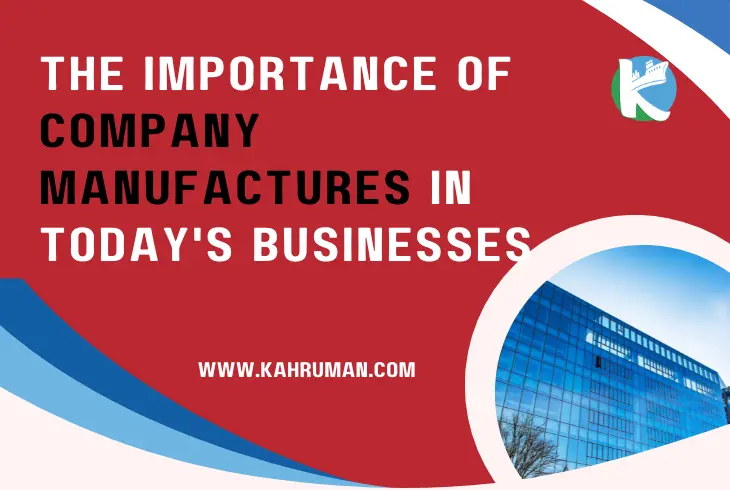What is the company manufactures?
"Company manufactures" can refer to a company that produces or manufactures physical goods or products for sale to direct customers. It is the same as a manufacturing company. These largest companies can have a wide range of products, from consumer goods such as clothing, electronics, and household appliances, to industrial products such as machinery, equipment, and fixed parts.
The company's manufacturing process involves several stages, including designing, prototyping, production, assembly, quality control, and distribution. Many manufacturing companies use specialized equipment and technology to improve production efficiency and product quality, and some have implemented advanced automation and artificial intelligence to streamline the production process.
Successful manufacturing companies must have effective sales and marketing strategies to promote their products and reach their target customers to increase profit. They must comply with various regulations related to safety, environmental impact, and labor laws, and they must continually innovate and adapt to changing market conditions.
What's the difference between manufacturers and manufacturers?
"Manufacturer" is a noun that refers to an individual or company that produces goods or products. At the same time, "manufactures" is a verb that refers to the process of having or making something.
For example, a company with cars is a manufacturer, while making those cars is a manufacturing process (manufacturers). The term "manufactures" can refer to the collective output of fabrication activities in a particular industry or country, such as the total value of goods produced by the production sector in a given year.
Is a company a manufacturer?
A company can be a manufacturer if it is involved in producing goods or develops products. A manufacturer is a company (provider) or an entity that transforms raw materials or components into finished products. Manufacturing can be done on a small scale, such as a home-based business producing handmade creations, or on a large scale, such as a multinational corporation making millions of products per year using advanced machinery and technology.
Many companies are involved in manufacturing, from small businesses to large corporations, across a wide range of industries such as food, clothing, electronics, automobiles, and more. The critical criteria for a company to be considered a manufacturer are that it must be involved in producing goods and can transform raw materials or components into finished products.
You can read more information about: The Importance of Product Specifications in Wholesale Purchasing
How do you know if a company is a manufacturer?
There are several ways to determine if a company is a manufacturer:
Review their products: One way to tell if a company is a source manufacturer is to look at the products they produce. If the company creates finished goods or products, they are most likely a manufacturer.
Research the company: By conducting research on the global company's background and operations, you can learn more about its manufacturing capabilities. Look for information about the company's production processes, the equipment they use, and the materials they work with.
Visit the company's facilities: Visit the company's manufacturing facilities. This will give you a firsthand look at their production processes and provide insight into their manufacturing capabilities.
Look for industry certifications: Many manufacturers hold certifications such as ISO 9001 or Six Sigma, which indicate their commitment to quality and continuous improvement in their development processes.
Read and review their website and app: You can take the answer for your question and look at the manufacture from images in website then you may decide to be investor by buying from this manufacture .
How do I find global manufacturers in Turkiye?
When looking for unit ofmanufacturers in Turkey, it's essential to conduct due diligence, research potential partners thoroughly, and verify their credentials and capabilities before engaging in business transactions.
You can find manufacturers in Turkey as a wholesaler by the following :
Use online B2B marketplaces: There are several online B2B marketplaces, such as Alibaba, Global Sources, and TradeKey, where you can find manufacturers in Turkey. These marketplaces have an extensive database of manufacturers and suppliers from various industries and countries, making searching for and connecting with potential partners easy.
Attend trade shows and exhibitions: Attending trade shows and exhibitions in Turkey can be a great way to find manufacturers. These events bring together manufacturers, wholesalers, and other industry players, providing an opportunity to network and connect with potential partners.
Contact Turkish Chambers of Commerce: The Turkish Chambers of Commerce can provide you with a list of manufacturers in your industry and connect you with potential partners. They can also provide valuable information about Turkey's business environment and regulations.
Search online directories: You can find Turkish manufacturers in Turkey by searching manuals such as TurkishExporter.net and TurkishManufacturers.com. These directories list Turkish manufacturers and provide contact information, making it easy to contact potential partners.
Ask for referrals: You can ask other wholesalers or industry associations for referrals to manufacturers in Turkey. They can recommend manufacturers they have worked with before or provide valuable insights into the manufacturing landscape in Turkey.
What company is an example of a manufacturer?
Turkey has many manufacturing companies across a wide range of industries, including automotive, textiles, electronics, and food processing. One example of a Turkish manufacturing company is Arcelik, a leading home appliance producer, including refrigerators, washing machines, and air conditioners. Arcelik has factories in several locations in Turkey and exports its products to more than 145 countries worldwide.
Another example is Kordsa, a leading manufacturer of industrial textiles used in various industries, including automotive, construction, and aerospace. Kordsa is based in Istanbul and has manufacturing facilities worldwide, including Turkey, the United States, Brazil, and Indonesia.
Oyak Renault is another example of a Turkish company that manufactures automobiles. The leading company limited is a joint venture between the Turkish Armed Forces Pension Fund and Renault, a French automobile manufacturer. Oyak Renault produces Renault-branded vehicles, including the Megane, Clio, and Fluence models, at its factory in Bursa, Turkey.
Is it better to buy directly from the leading manufacturer?
Whether it is better to buy directly from the manufacturer depends on various factors, such as the product you want to buy, the quantity you need, and your specific business needs.
There are some potential advantages to buying directly from the manufacturer, such as:
Lower prices: When you buy directly from the manufacturer, you can get a lower price because no intermediary is involved.
Better control over quality: By working directly with the manufacturer, you can have better control over the quality of the products you are buying and the cost, and you can communicate any specific requirements or customizations directly to the manufacturer.
Access to a broader range of products: When you work directly with the manufacturer, you may have access to a broader range of products and options that may not be available through a distributor or retailer.
Improved communication: By working directly with the manufacturer, you can communicate better and build a stronger relationship with them, leading to better collaboration and problem-solving.
However, there are potential drawbacks to buying directly from the manufacturer, such as:
Higher minimum order quantities: Manufacturers may require higher minimum order quantities, which can be challenging for small businesses or those with limited storage space.
Longer lead times: When you buy directly from the manufacturer, lead times may be longer because the product needs to be produced and shipped from their main factory.
Limited expertise: If you are still familiar with the manufacturing process, buying directly from the manufacturer may require more knowledge and effort to ensure that the product meets your quality and safety standards.
Limited warranty and after-sales support: Manufacturers may offer a different level of security, and after-sales support than distributors or retailers, which can be a risk if you encounter any issues with the product.
What are the different types of manufacturing processes?
There are several manufacturing processes, each with advantages and disadvantages. Here are some of the main common types:
Casting: This process involves pouring molten material, such as metal, into a mold to create a specific shape. Casting makes objects like car parts, jewelry, and machine components.
Machining: This process involves cutting and shaping material, typically metal, using a machine tool like a lathe, milling machine, or drill press. Machining is used to create complex parts for products like engines, tools, and medical devices.
Forming: This process involves shaping materials using force or pressure, such as bending, stamping, or forging. Comprising is used to create objects like sheet metal parts, bolts, and screws.
Joining: This process involves combining two or more materials to create a new product. Examples of joining processes include welding, soldering, and adhesive bonding.
Additive manufacturing: This process involves building a product layer by layer using a computer-controlled machine, such as a 3D printer. Additive manufacturing creates complex shapes and structures for products like prototypes, medical implants, and architectural models.
Assembly: This process combines multiple parts or components to create a finished product. Assembly can be done manually or with the help of automation and is used to develop products like cars, electronics, and furniture.
Continuous manufacturing: This process involves constantly flowing raw materials into finished products without stopping the production line. Continuous manufacturing creates products like chemicals, food, and textiles.
How do you start a company that manufactures?
Starting a company can be a complex and challenging process, but here are some general steps that you can follow in manufacturing products for your company:
Develop a business plan: This should include your goals, target market, product or service offering, financial projections, and marketing strategy.
Conduct market research: This will help you determine the viability of your product or service, identify your target market, and understand the competition.
Identify your manufacturing process: Determine the manufacturing process you will use to produce your product. Consider the equipment, labor, and raw materials required for your manufacturing processes at the company.
Develop a supply chain: Identify and establish relationships with suppliers and distributors for the necessary raw materials, equipment, and products.
Obtain funding: Determine how much money you need to start your manufacturing company and consider your funding options, such as self-funding, loans, and investors.
Choose a location: Select a suitable location for your manufacturing company based on factors such as access to raw materials, transportation, labor, and energy costs.
Obtain necessary permits and licenses: Depending on your location and industry, you may need to obtain licenses, access, and certifications to operate your manufacturing company.
Hire and train employees: Hire qualified staff and provide them with the necessary training and equipment to carry out your manufacturing process.
Test and refine your product: Test your product to ensure it meets your quality standards, and refine it based on customer and market feedback.
The importance of maintaining high-quality standards in the manufacturing process:
Maintaining high-quality standards in the manufacturing process is crucial for several reasons:
Customer satisfaction: High-quality products meet or exceed customer expectations, increasing customer satisfaction and loyalty. Customers are more likely to return and recommend products to others if they are satisfied with the quality.
Reputation: Manufacturing companies with a reputation for producing high-quality products are more likely to attract new customers and retain existing ones. This can lead to increased market share and revenue.
Cost savings: High-quality products have fewer defects and require less rework, resulting in lower costs and increased efficiency in the manufacturing process.
Compliance: Many industries have regulations and standards that must be met to ensure the safety and quality of products. Maintaining high-quality standards ensures compliance with these regulations, reducing the risk of fines, legal action, or damage to the company's reputation.
Innovation: High-quality standards encourage innovation by providing a framework for continuous improvement in the manufacturing process. Companies that strive for high quality are more likely to invest in research and development, leading to the creation of new products and processes.
How can high-quality standards impact a company's reputation and bottom line?
Maintaining high-quality standards can have a significant impact on a company's reputation and bottom line in several ways:
Brand reputation: A company's brand reputation is closely tied to the quality of its products. Consistently delivering high-quality products can enhance a company's reputation, increasing brand loyalty and positive word-of-mouth marketing.
Customer satisfaction: Customers are more likely to be satisfied with a product that meets or exceeds their expectations for quality. Happy customers are more likely to return and recommend products to others, increasing sales and revenue.
Repeat business: High-quality products can lead to repeat business from satisfied customers. This can help establish a loyal customer base and increase revenue.
Reduced costs: High-quality products are less likely to require rework, repairs, or returns, reducing costs associated with these activities. This can result in cost savings and increased profitability.
Competitive advantage: A company that consistently produces high-quality products can gain a competitive advantage over other companies that offer lower-quality products. This can help the company maintain market share and increase profitability.
What are the three methods of manufacturing?
The three main methods of manufacturing are:
Additive Manufacturing: Also known as 3D printing, additive manufacturing is creating a product by adding layers of material on top of each other until the final product is complete. This method can be used with various materials, including plastics, metals, and even food.
Subtractive Manufacturing: This method of manufacturing company involves removing material from a larger block or piece of fabric to create the desired shape. This is typically done using tools such as lathes, milling, or CNC machines.
Forming and Molding: This method involves applying force, heat, or pressure to shape a material. Examples include injection molding, blow molding, and compression molding. This method is commonly used to produce products made from plastics, rubber, and other materials that can be molded or formed.
What is lean manufacturing?
At its core, lean manufacturing involves designing and manufacturing products to maximize value and minimize waste. This means focusing on the customer's needs and creating products that meet those needs efficiently, with minimal waste and no defects. It involves identifying and eliminating non-value-added steps in the production process, such as waiting, overproduction, and excess inventory.
A company manufactures that have successfully implemented lean manufacturing processes at the company can significantly reduce lead times, cut down on inventory costs, and increase throughput. For example, a semiconductor plant that produces chips using lean manufacturing techniques can have more units in a week than one that doesn't. It can do it with fewer people, fewer hours, and fewer variable costs.
Lean manufacturing can be applied to any industry for a product, whether it is a single desk manufacturer or a global leader that sells souvenirs and cassettes to people worldwide. One example of a company that has successfully implemented lean manufacturing is Daqo, a manufacturer of proprietary engineering solutions. Daqo has reduced its lead times from days to hours and now produces yearly units in a fraction of the time it used to take.
In practice, lean manufacturing involves creating a "menu" of production systems designed to meet the customer's needs. Based on customer and production team feedback, these systems are constantly refined and improved over time. The goal is to create a flexible, responsive production system that can quickly adapt to changes in demand and supply.
How a company's manufacturers can stay competitive?
There are several ways a company manufactures can stay competitive:
Innovation: A company can stay competitive by investing in research and development to create or improve new products. This can help the company manufactures products to remain ahead of the curve and meet changing customer demands.
Cost control: Controlling costs of manufactured products through efficient production processes, waste reduction, and supply chain management can help a company remain competitive in pricing and profitability.
Quality: Maintaining high-quality standards in production can help a company differentiate itself from competitors and attract customers who value quality.
Flexibility: Quickly adapting to changes in the market, customer needs, or supply chain disruptions can help a company stay competitive.
Customer focus: Understanding customer needs and preferences and delivering products and services that meet or exceed their expectations can help a company stay competitive and build brand loyalty.
Strategic partnerships: Developing strategic partnerships with suppliers, distributors, and other companies can help a company with limited access to new markets, technology, and resources to stay competitive.
Company manufactures in Turkiye
In Turkey, there are numerous companies that specialize in manufacturing various products. These type of companies are known for their commitment to quality, innovation, and efficiency in their manufacturing processes. They have dedicated units and teams that focus on design, development, and production of a wide range of goods.
You can read more information about: Supply Chain Visibility: Key Factors for Success










